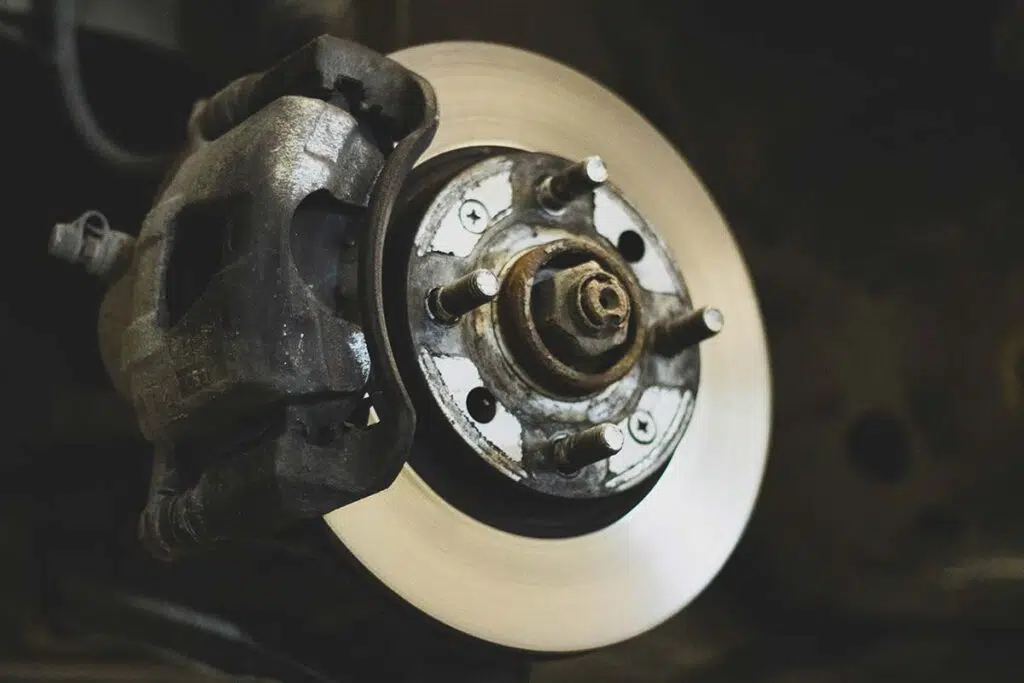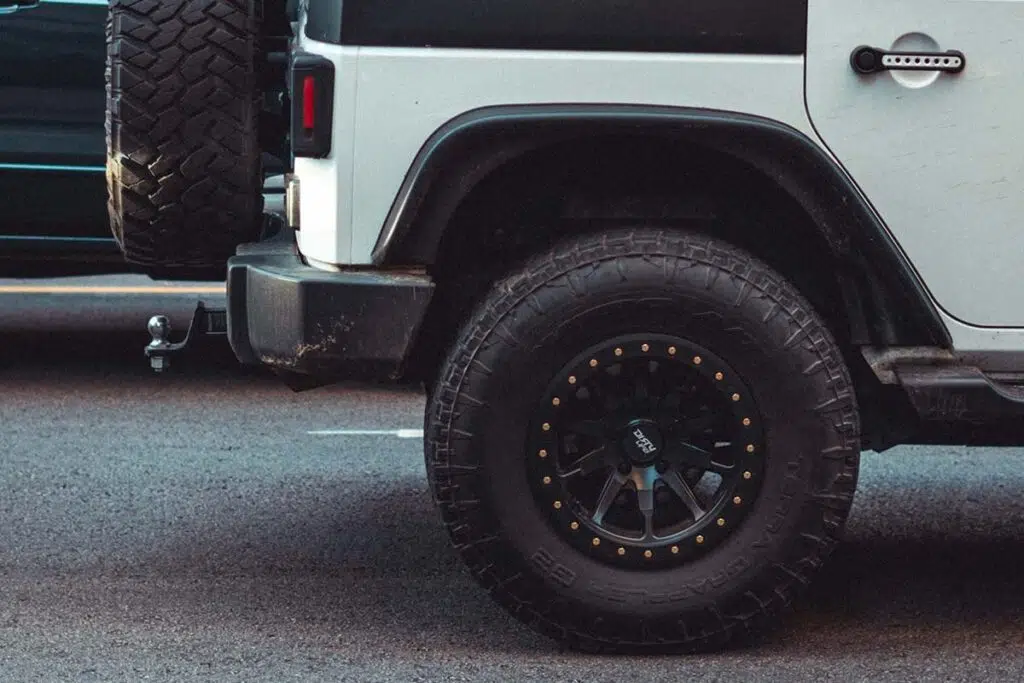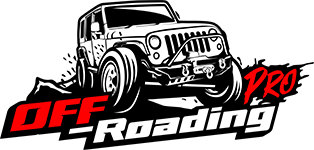The braking system is fundamental to your vehicle and helps keep you safe on the road. Brake discs, in particular, are made of highly-durable material – cast iron, carbon ceramic, or steel (sometimes coated with tungsten carbide). They operate quietly when in good working condition. However, they may start squeaking at some point.
Reasons why brakes squeak involve issues with the brake pads, calipers, or rotors. It can also be linked to installation mishaps or design flaws. Steps on how to stop squeaky brakes are pretty straightforward.
Here are the most common causes why brakes squeak:
- Brake pad compound
- Worn brake pads
- Uneven brake pad wear
- Warped brake discs
- Filthy brake system components
- Inadequately lubricated drum brakes
- Interrupted grooves
- Moisture
- Overloading
- Negligence
- Braking habits
When affronted with braking system issues, the first thing you should do is identify the root cause. In doing so, you can proceed with how to fix squeaky brakes the right way. This guide will help you do just that – as it goes through the potential reasons behind squeaking brakes and how to rectify them.

Squeaking Brakes Causes
Vehicle owners know too well that the occasional screeching is not something to worry about. As a component that creates friction, brakes would naturally produce sounds every once in a while. But if squealing happens way too often and in unusual instances (at slow speeds or when making turns, for instance), then it is high time to look into one of the below problem sources:
1. Brake Pad Compound
The brake pad material is partly responsible for that swishing noise you hear during those traffic light stops on your way to work. And depending on whether your brake pad contains metallics or Kevlar, the pitch and frequency of those squeaks may vary.
For instance, metallics are more prone to rust formation versus ceramics and the like. Hence, the proclivity for squeaking brakes increases and tends to happen earlier.
Switching to brake pads of a different material and ensuring metallic brake pads are rust-free are some ways to eradicate squeaking noises. There are even aftermarket brake pads designed to tone down the tune that brake pads make.
In choosing an alternative for your car, consider grip, dust creation, price, and brake pad life. Ceramic-based variants like Power Stop Front and Rear K5952 Carbon-Fiber Ceramic Brake Pads (view on Amazon) are highly desirable, as they come fitted with Teflon-coated shims already installed.
This is not to say that all anecdotal screeches can be resolved the same way. There is a huge difference between the sound produced by brake pads “sweeping off a thin film of rust that formed on the iron discs” and that of brake pads reaching their service limit (the latter sounds more like ripping a metal sheet).
However, if you are certain the squeal from your brakes is normal, reduce the noise by giving the brake pads a good coating of anti-squeal compounds (a.k.a. heat-resistant polymer adhesives) available in spray and liquid application form.
2. Worn Brake Pads
Whether or not your brake pads have a built-in wear indicator, they are bound to emit an unpleasant screech when approaching their service limit.
Wear indicators (metal tabs typically found near the top of brake pads) are just there to call your attention more effectively. Their absence does not affect the likelihood of hearing your brakes squeaking, but it may put drivers who delay the replacement of worn-out components in precarious situations.
Changing brake pads to fresher, thicker ones resolves squeaky brakes. Mechanics even have an acronym for what you need to potentially replace – CPR (calipers, pads, rotors). But it is not the only reason promptly doing this action is highly recommended.
More than eradicating brake squeals, replacing worn brake pads in a timely manner ensures their metal backing plates do not grip the brake rotors and cause serious damage.
3. Uneven Brake Pad Wear
Aside from the timely replacement of brake pads, it is also crucial to check if they have even wear. Uneven pad wear can be caused by several things, including incorrect shims, caliper failure, and DTV (Disc Thickness Variation). Warped or disfigured brake discs – or those with DTV – have flat spots that chew away at brake pads, causing uneven wear.
To prevent unevenly worn brake pads, check that the piston seals inside the caliper are not sticking and are in good condition, caliper slide pins are not corroded, and brake pads are properly aligned.
Brake rotors should also be free from dirt buildup and corrosion. For newly installed rotors, ensure they are not covered in dirt or grease and that the rust-resistant coating has not yet come off.
4. Warped Brake Discs
Brake pads press against the brake discs or rotors whenever you bring your vehicle to a stop. This process is usually quiet unless you have newly-installed pads that have not been bedded in yet. But it is a different story if your rotors are warped.
The vibrations naturally occur when pads press against the discs worsen, escalating into squeaky brakes. It also does not help that a lip is formed on the edge of the brake disc as the latter wears down.
Depending on how badly warped it is, a brake disc can be straightened or ‘resurfaced’ by a professional mechanic. However, the number of times this procedure can be repeated is limited.
It is unwise to have your brake rotors too thin, lest you risk a braking system failure. That said, you will need to shell out at least $350 for a pad-rotor combo if your brake discs are beyond fixable.
5. Filthy Brake System Components
Vehicles exposed to the elements or sitting in storage for extended periods are usually prone to debris or dust buildup between their brake pads and rotors (view on Amazon).
And when I say exposed to the elements, I do not just mean off-roading 4x4s. Dust and dirt collecting on surfaces of different brake system components can happen in various riding conditions (Colorado and California residents can attest to this).
If the brake pad and rotor surfaces are just slightly plugged, a few brake applications would be enough to wick away the debris. But for thicker dust and dirt accumulation, spraying the affected areas with brake cleaner or sanding down the surface material usually resolves the problem.
6. Inadequately Lubricated Drum Brakes
For older vehicles still using drum brakes, squeaky brakes could occur if the drums are not properly lubed – specifically, the contact points between the shoes and drum. The shoes scrape against the metal backing plate without proper lubrication, resulting in an unpleasant squealing noise.
The metal backing plate has a portion that is exposed – you can begin examining the component for signs of scraping here should you suspect that lubrication is inadequate.
7. Interrupted Grooves

Like brake rotors, drums also get straightened or resurfaced once in a while to maintain the quality of their mating surface. During the procedure, the cutting bit on the brake lathe removes old braking surfaces and creates a groove on the polished surface for the brake shoes to follow.
If done correctly, the groove is supposed to be uninterrupted (like the grooves on an LP record). Otherwise, a broken groove will cause the brake shoes to snap back and hit the metal backing plate.
Interrupted grooves produce a very distinct thumping noise (usually from the rear of the vehicle when braking). There are several ways to address it. One is to simply replace the affected drum brakes. Another is to remove the drums and sand the mating surface with sandpaper.
A third (not to mention less popular) approach entails utilizing the emergency brake. This last bit requires some bravado, mechanical skill, and a good understanding of how your car works. Also, it only applies to select vehicles – particularly those with the emergency brake handle in the center console and not coming out of the floor (the latter cannot be set and released as quickly as needed).
How to Fix
To execute this ’emergency’ fix, you will need to do the following steps:
- Drive your vehicle without exceeding 40 mph (64 km/h).
- Gently pull up on the e-brake while holding the release button. This way, the former will not lock in the braking position.
- Hold onto the emergency brake for only three seconds. Otherwise, you will overheat the drum brakes.
- Repeat step #3 3-5 more times while keeping a steady speed. You will notice the sound produced by your squeaking brakes drastically diminished (if not disappear completely).
- Drive your vehicle at normal speeds, using the brakes as you normally would.
These five steps get your rear drum brakes to momentarily do 100% of the braking, consequently causing the brake shoes to polish the interrupted grooves on the drum.
Although you would not be able to find this process in any owner’s manual, it has been tested and proven to work as the steps were born out of trial and error by a handful of car savants.
8. Moisture
If your car is exposed to snow, rain, or humidity overnight, chances are you will hear squeaking brakes first thing in the morning. The reason behind this is a thin layer of rust that forms on the rotor surfaces the moment moisture sets in.
This buildup can go away with normal driving, although parking your vehicle inside the garage is better at protecting its brakes from moisture accumulation.
9. Overloading
Going beyond your vehicle’s payload capacity strains its braking system components. You may hear squeaking noises even when your brake pads and rotors are far from hitting their service limit.
Aside from noisy brakes, your vehicle’s braking distances increase, and other systems become compromised. Premature breakdown of your car’s frame, drivetrain, and suspension are also expected.
Having too many passengers or putting too many items inside the trunk cannot always be helped, especially during emergencies. However, staying within your vehicle’s GVWR (Gross Vehicle Weight Rating) is still the best way to avoid dealing with squeaky brakes.
10. Negligence
Moisture and faulty components are not the only factors responsible for squeaky brakes. Like all other vehicle issues, having brakes squeak when stopping slowly can happen due to human error or carelessness.
For instance, a car technician may forget to get the caliper pins properly cleaned or coat the pads with an anti-seize compound after changing the rotors. Either that or newly installed brake pads and discs may be poorly fitted.
Whichever the case, being more attentive while servicing brakes will tremendously help keep your braking system quiet.
11. Braking Habits
Going ham on the brakes (especially at high speeds or when going downhill) can wreak havoc on your brake system components. This is because hard and fast braking results in the glazing of brake pad surfaces.
The constant friction from harsh braking practices causes a spike in temperature that goes beyond what conventional brake pad designs can tolerate. This outcome eventually renders brake pads useless, as the latter can no longer generate the friction a vehicle requires to stop.
Driving habits are not always to blame. If you are dealing with a squeaking noise while driving, but no brakes are applied, your car may be going through a mechanical or hydraulic failure in the brake caliper leading to glazing. This particular situation is quite perilous, as it occurs without any tell-tale sign being made known to the driver.
As soon as you experience the above, immediately inspect your brake pads for signs of glazing. Brake pads in good condition should have a smooth, glassy finish.
Pad surfaces outside this description warrant an immediate replacement, alongside examining the calipers and hydraulic system and cleaning and resurfacing brake rotors.
Why Do My Brakes Squeak When I Back Up?

The answer to this depends on the time of day, the brake pad’s mechanism, and your vehicle’s make and model. Baffled? Let me explain.
If you are getting squeaky brakes early in the morning (usually on your way to school or work), moisture may have built up overnight, and your brake pads are just about to get rid of that accumulated moisture the moment you start driving. Pay attention to whether this time pattern is consistent for your car. If it is, you fit right in this scenario.
As for its mechanism, brake pads predominantly run forward. As such, they also get scrubbed in that same direction almost entirely. So when you run your vehicle backward or engage reverse, the brake pads go against the grain. Hence, they would oscillate more in this direction and produce squeaking noises.
Lastly, some OEMs did have issues with their brake systems at some point. Volkswagen, for instance, released a TSB covering some brake system component issues in the early 2000s.
Verifying if the same is true for your vehicle is pretty straightforward. Look up recent TSBs or recalls related to brake systems issued by your car manufacturer.
Can You Spray WD40 on Brakes?
There are opposing views about whether or not it is appropriate to use WD40 on brake components. It may temporarily reduce those annoying squeaking noises. But some automotive experts advise against it since the formula can reduce friction where needed, potentially damaging brake components.
WD40 primarily works as a solvent, meaning it is intended to dissolve rust and not make squeaking disappear. Perhaps, the reason many believe that using WD40 is beneficial is that it has lubricating properties.
You should never be swayed by this fact, though. Spraying the solvent on brake system components such as rotors will cause rotor malfunction and, ultimately, brake system failure. It also compromises brake pad integrity and causes corrosion on piston seals.
Instead of WD40, these same groups recommend opting for aftermarket brake shims (view on Amazon) to reduce the noise made by squeaky brakes.
Conclusion – What Causes Squeaky Brakes
To summarize, here are common reasons behind squeaking brakes:
- Brake pad compound
- Worn brake pads
- Uneven brake pad wear
- Warped brake discs
- Filthy brake system components
- Inadequately lubricated drum brakes
- Interrupted grooves
- Moisture
- Overloading
- Negligence
- Braking habits
By sharing relevant causes and remedies in this article, I hope you can properly diagnose and resolve the culprit behind those unpleasant squealing noises. But ultimately, conscientious driving habits, prevention, and proper upkeep of brake system components are still your best defense against squeaky brakes.
Kris is an avid off-roader and outdoor enthusiast who loves to brave the elements and take on challenging terrain. He also enjoys sharing his passion and knowledge with others so that they, too, can appreciate the ride.
About Kris
